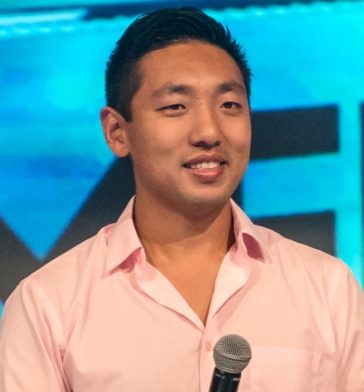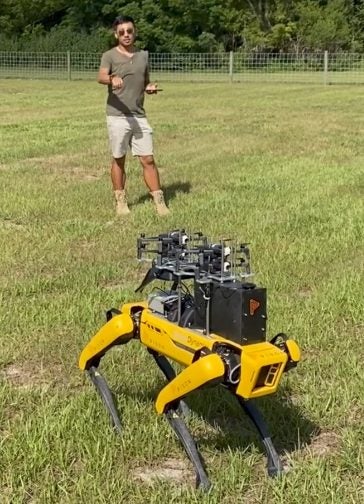
By Neil Nachbar
When David Cipoletta was an undergraduate student at the University of Rhode Island, he had no idea he would become a co-founder of a successful technology company just a couple of years after graduating, but he certainly put himself in a position to do so.
Cipoletta, who is the chief technology officer Pison Technology, in addition to being the co-founder, earned three bachelor’s degrees from URI in 2014. They were in electrical engineering, computer engineering and computer science.
“My three undergraduate degrees allowed me to be a system-level thinker and combine the variety of the skills I learned from each discipline,” said Cipoletta. “There are many courses that are cross-disciplinary, which has allowed me to integrate the skills I learned.”
With three degrees under his belt, Cipoletta, who is from Chepachet, decided to seek a fourth. While working at Charles River Analytics as a robotics engineer, he pursued a master’s degree in electrical engineering at URI.
Associate Professor Kunal Mankodiya recalled the potential he saw in Cipoletta as a graduate student in his Internet of Things course in the fall of 2015.

“I knew from the beginning that David had the passion and hunger to contribute to society with his engineering and problem-solving skills,” said Mankodiya. “I vividly remember David’s course project that closely resembles the product Pison is producing now. He was excited about the opportunity of being in a project-based course that allowed him to lead a team of four students.”
It was through Mankodiya’s course that Cipoletta would meet someone who shared his passion for helping others through the use of technology.
A guest speaker in Mankodiya’s course, Tom Kowalczyk, introduced Cipoletta to a man named Bobby Forster who was living with amyotrophic lateral sclerosis (ALS), a progressive nervous system disease known as Lou Gehrig’s disease.
Forster expressed an interest in working with students on creating accessibility devices. Cipoletta decided to work on an eye-tracking robotic arm for Forster and others with ALS.
A Common Connection
“I told my co-worker at Charles River Analytics, about my work with Bobby on the eye-tracking robotic arm,” said Cipoletta. “My co-worker happened to be a fraternity brother of someone at MIT named Dexter Ang who was already working with Bobby on an advanced study he was conducting on helping people with disabilities.”
When Cipoletta realized that he and Ang had the common goal of assisting Forster and others with ALS, they decided to meet and compare notes.
“My first impression of Dexter was that he is very driven by this mission of helping people with ALS,” said Cipoletta. “Using my engineering skills, I created a prototype of our first device within two weeks in my apartment. We then decided to pursue funding with the prototype.”
From Prototype to Profit
Cipoletta and Ang had extensive engineering knowledge, but no business experience.
“As an engineer, the concept of starting a business was nice, but neither of us had ever built a business before,” said Cipoletta. “I saw how our prototype helped people with disabilities, which made me believe in its potential. That’s what motivated us to find sources of funding.”
Ang, who graduated from the Massachusetts Institute of Technology with a bachelor’s in mechanical engineering in 2005, was already motivated to use technology to help those with ALS after seeing his mother suffer from the disease. Ang’s mother died in 2015, just months before he met Cipoletta.
Ang and Cipoletta assembled a startup team, which included Forster and Wenxin Feng, a doctoral student in human-computer interaction at Boston University. Almost immediately, the project drew support. The new company received $25,000 from the MIT Sandbox Innovation Fund Program.
Five years after officially launching their business in 2016, Cipoletta and Ang have seen Pison grow by leaps and bounds, in terms of scope, staff and funding.
As of March 2021, Pison had more than 40 employees and closed a $7 million round of funding, bringing its total funding to $11 million.
While the company, which is based in Boston, has maintained a strong relationship with the ALS community, its focus has expanded to areas such as robotics, the Internet of Things and augmented reality.
“Pison’s mission is to harness the power of human intent to change the world’s form and function,” said Cipoletta. “We are looking to better serve people in need with our device in the disability, space, defense, industrial, and consumer markets. However, having the solution to a problem that does not exist is not how we want to build our product. Our focus will be customer-based and we will work with end-users to create the custom solution to meet their needs.”
Pison specializes in, among other things, hands-free control of electronics. Neuromuscular signals on the surface of the skin are combined with machine learning algorithms to interpret how people intend to move their hands, and then those signals are transmitted to a smartphone to control digital devices.
Decisions, Decisions
Cipoletta’s workdays are filled with important meetings and decisions that help determine the company’s future.
“My average day involves back-to-back meetings from 8 am to 6 pm,” Cipoletta said. “The conversations can range from company strategy, to deciding on technical implementation for cross-functional problems. Currently, I am working on non-recurring engineering contracts with our base platform, while developing our next-generation product.”
Cipoletta manages between 25 and 30 engineers, with seven reporting directly to him. Ang told BostInno in March that Pison plans to hire 50 more employees over the next two years, including engineers with expertise in machine learning and cloud computing, as well as software, mechanical and electrical engineers.
Advice for Students
For engineering students who wish to start their own company as he did, Cipoletta encourages young professionals to be patient and to network as much as possible.
“It’s not an easy journey and it’s certainly not a sprint,” said Cipoletta. “Being an entrepreneur is not a new concept, so reach out and ask questions. You don’t need to reinvent the wheel. Network with people who have experience in the process and learn from them. Lastly, you have to be adaptive. You will face new challenges every day. Your thinking will evolve from a two-person team to five, and then 10 people.”
